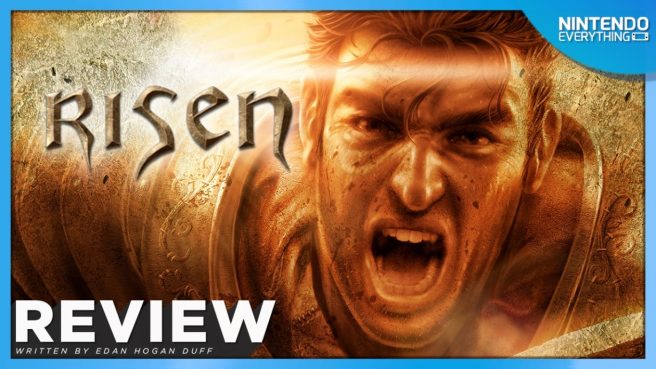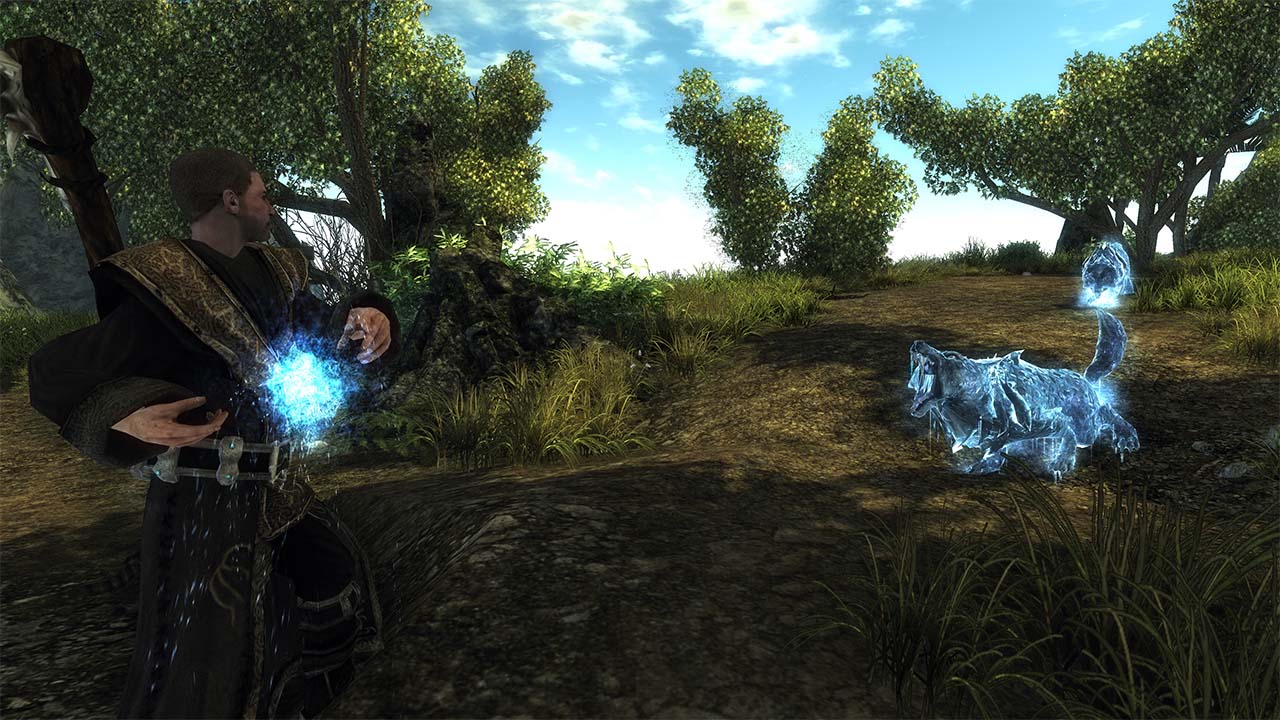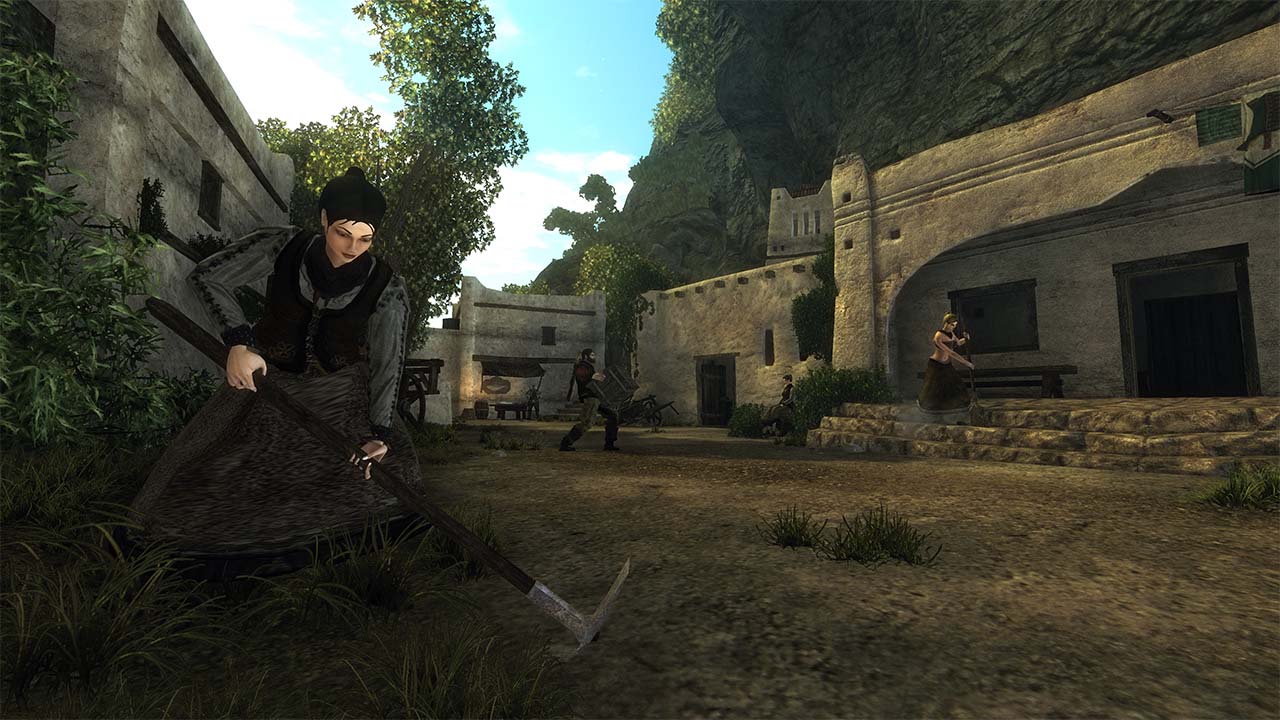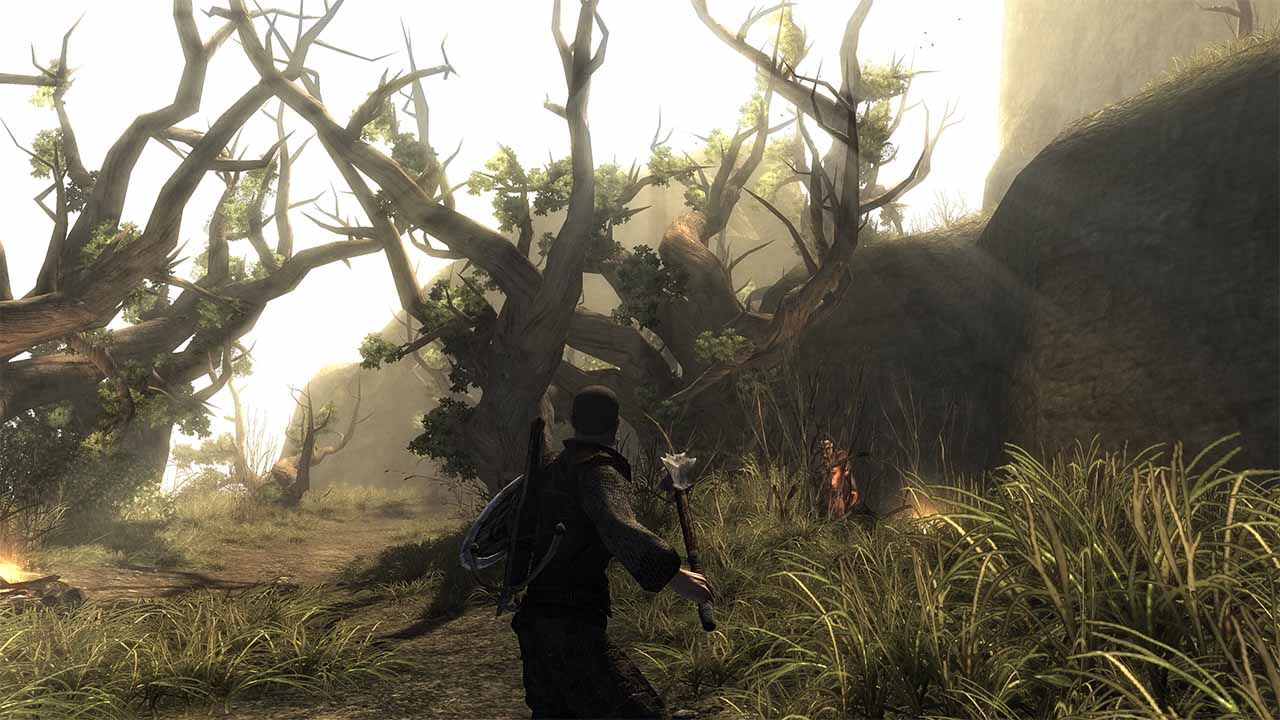System: Switch
Release date: January 24, 2023
Developer: Piranha Bytes
Publisher: THQ Nordic
Risen is a peculiar beast. This action RPG originally graced our consoles back in 2009, where it served as something of an amalgamation of various different western franchises. It featured moral conundrums akin to Mass Effect, a lush open world reminiscent of Fable, and systems that wouldn’t seem out of place in an Elder Scrolls title. The game has garnered a bit of a cult following across the community since its original release (and the release of its two sequels). With Risen’s arrival on Switch – along with the measured benefit of hindsight – have THQ Nordic and Piranha Bytes graced us with a hidden RPG gem? Or has age diminished the game’s quirky, ethereal appeal?
Risen kicks off with a gloriously dated looking CGI cutscene, where you witness your character (The Nameless Hero) stowing away on a small sea-vessel. Following a particularly nasty storm, you’re thrown overboard and you subsequently wash up on the shores of Faranga, the game’s open-world, fantasy island setting. This island will accommodate your adventures across the game’s 30-40 hour lifespan, as you figure out why mysterious temples have emerged from the ground spewing all manner of eldritch beasties out into the general populace.
Visually, Faranga adopts a Mediterranean aesthetic which – while nice looking on the odd occasion – is more likely to strike you as quite rough around the edges in 2023. Textures are notably mushy, landscapes tend to devolve into soup as you look off into the horizon, and environmental weather effects are thoroughly unremarkable. Once your shaven-headed, late 00s wonder of a main character collects himself amidst the stormy shores of Faranga, the game’s strongest act begins in earnest.
Perhaps the heaviest dose of complimentary gush I can level at Risen is that its opening three hours are something very unique. A common trope of the modern action RPG is that you as a player will find yourself being pulled between two different warring factions, both vying for power and influence. Risen is no different in this case, however the way in which the game slowly builds out the identity of these factions – along with the world they inhabit – is truly refreshing. At least initially, this slow and methodical burn had me hooked. The game spent ample time allowing me to get to know ordinary people, do odd-jobs for them, soak in the mood and circumstance of their lives, and through that process come to my own natural conclusions regarding the motives and ideals of each opposing group. This all happens at the pace of the player and occurs mostly through conversation, and the sheer variety of different routes you can take to get to the main crux of the game’s narrative is dizzyingly impressive.
At points, this long winding introduction to the game feels aimless, and at others it feels emergent and bravura – it peaks and slumps in the way an adventure like this would, were it to take place in the real world. It’s a very welcome antidote to the rollercoaster intro sequences we tend to experience in other, more notable action RPGs. Sadly, this cadence isn’t to last. Once you reach one of two major initial hubs in the game a large amount of the subtlety and nuance it flaunted up to that point is lost, as the game devolves into a poorly aged take on more traditional action RPG fare.
Don’t get me wrong, I have no qualms with a reliably solid, well-worn cast of the action RPG mold. In order for a game to achieve that, however, a certain base level of mechanical quality must be met. Unfortunately, Risen fails to meet that bar at just about every turn. Once you’re through the game’s opening hours, it becomes apparent that all of the characters you can speak to on Faranga have a very specific dynamic to their personality. They will be aligned to one of the game’s two main factions in some significant way, and they’ll also have a slightly off-kilter personal issue that you can help them with.
Once you reach the game’s main city hub, this dynamic is repeated far too frequently for you not to notice – which serves as a stark contrast to the subtlety of the game’s introduction. Risen’s more informal approach to tracking quests and activities means that you’re left to your own devices when it comes to figuring out where to go and what to do a lot of the time. Normally I’d commend this, but the game goes from slowly building out story beats, teaching you mechanics, and conservatively dishing out tasks – to piling the side-quests, side-characters, and side-activities high at the drop of hat. This, coupled with a clunky and ineffective quest log just serves to confuse and irritate. This change of pace doesn’t let up for quite some time – too long, in fact. It resulted in me having considerable issues trying to wrap up quests I received earlier in the game, along with developing a distinct aversion to picking up any new ones that might distract me from the critical path. If an RPG’s shortcomings end up discouraging exploration, I see that as a significant issue.
Combat in Risen is almost unspeakably bad. You can adopt a fighting stance by drawing your weapon, at which point your aim might lock on to the nearest, most dangerous enemy – alternatively, it will lock on to an enemy sitting 15 feet away, casually eating their dinner. Actually swinging a sword, club or combat staff lacks any tangible feedback – in fact, the best way I can describe it is that it almost feels turn-based in nature, despite being fully real-time. You can dodge enemy attacks by rocking the left analog stick right, left or down twice, this then “queues up” a dodge that will take place after your current move. It feels shockingly unresponsive, even by 2009’s more lax standards. Archery and spell-casting aren’t much better either, as positioning yourself effectively can be impossible with enemies skittishly dashing around the environment, and in and out of range. Once you’ve wrapped up the vaudeville routine of going toe to toe with a monster/animal/human, you’ll have a host of rewards that can be looted from the bodies of the fallen and from nearby chests. Meat gathered from animals can be cooked at any fire (providing you have a frying pan), weapons and trinkets can be sold or crafted into rarer, more valuable items (which is admittedly quite satisfying), and the resulting gold you earn from your excursions can be put into leveling yourself in a suite of skills, spells and abilities.
Speaking of leveling up, Risen’s approach to this RPG cornerstone is somewhat novel and unique if you haven’t played a Piranha Bytes game before. There are no specific character classes in Risen – you’re free to shape your character as you see fit. We’re well used to this approach nowadays, however to the game’s credit it was a little more surprising to see this back in 2009. You will gain experience by engaging in just about any activity the game has to offer. Once you level up, you’re given a boost to your HP and a set of LP (Learning Points). You can then cash those points in (for an additional fee) at any of the game’s trainers to level up your stats and gain new abilities. It’s a serviceable enough attempt at contextualizing your character’s improving abilities, however it gets quite difficult to keep track of who-trains-what owing to the general lack of guidance the game gives you. As the story progresses and your character’s allegiances potentially change, this can make leveling up a genuine chore. As for that tale of warring factions entrenched on the island of Faranga, it sadly peters out into a fairly predictable, boiler-plate fantasy. There are quite a number of choices that can be made that will change the route, but the destination remains the same regardless. This sticks out as a huge missed opportunity, again owing to the mystique and allure of Risen’s opening act.
All of the above is also directly affected by the game’s transition to Switch, which regretfully hasn’t been a smooth one. Risen hasn’t been given any TLC on a visual level for this re-release – it’s very clearly a port, and not a remaster. Some additional care and attention paid to the game’s art could have blunted some of its sharper missteps and generated more interest, alas we’re left with a straight conversion. Performance is where the game really struggles however, thanks to its fully uncapped frame rate on Switch. If you’re indoors, the frame rate will jump up to a near-locked 60 FPS. Venture outside, and that number tumbles to anywhere between 25 and 35 FPS. It’s the variance between the upper and lower limits that really hurts the overall experience here. Hopefully THQ Nordic will consider implementing a 30 FPS cap in order to make the game’s performance more consistent and less variable.
The Verdict

For every design decision that benefits Risen, it feels like there are another three queuing up to detract from the experience. These shortcomings embellish the game with just enough tedium to really hamper the allure of discovery. Its opening act teases an ambitious game that takes just enough from its contemporaries to propel itself to new and uncharted RPG waters. The game we’re ultimately left with buckles under its own ambition, relying on flawed systems and wonky mechanics to sustain itself. Outlasting its welcome, it sputters across the finish line mired in its shortcomings. It’s not entirely without merit – no game is – however I can’t recommend Risen to the modern Switch owner, even if they’re gasping for an RPG fix.
Risen copy provided by the publisher for the purposes of this review.



